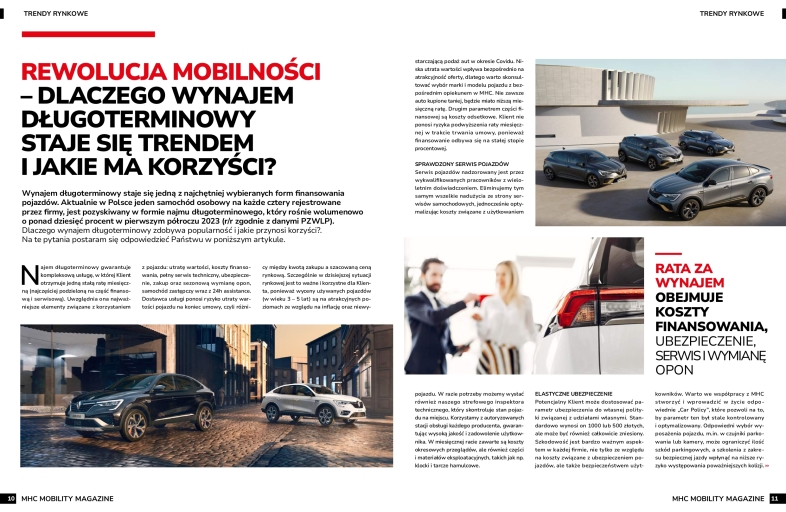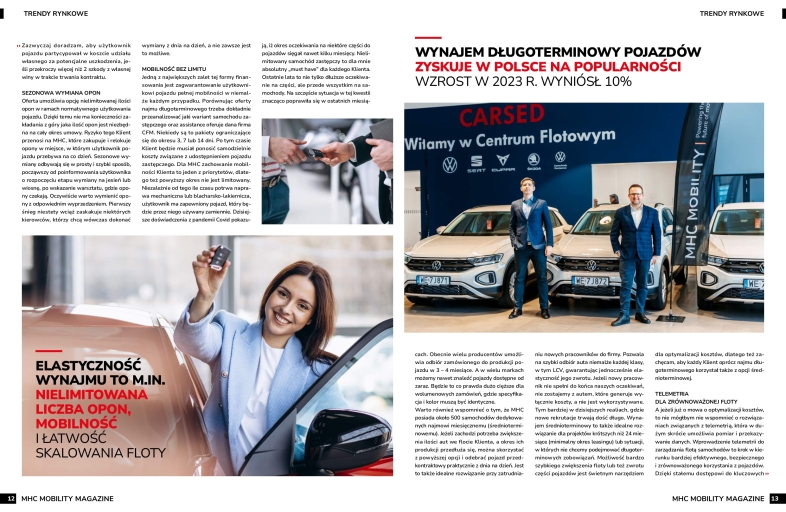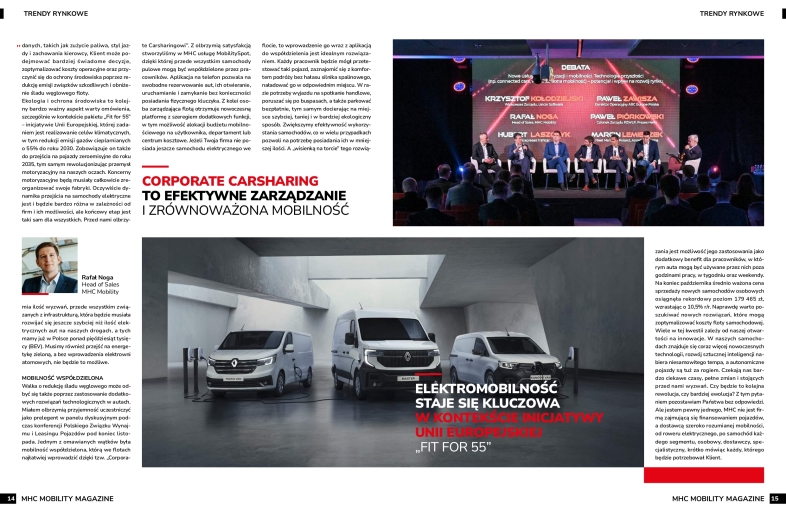Long-term rental is becoming one of the most preferred forms of vehicle financing. Currently in Poland, one passenger car out of every four registered by companies is acquired through long-term rental, which grew in volume by over ten percent in the first half of 2023 (year-on-year according to PZWLP data). Why is long-term rental gaining popularity and what benefits does it bring? I will attempt to answer these questions in my article below.
Long-term rental guarantees comprehensive service, where the client receives a fixed monthly rate (usually divided into financial and service parts). It includes the most important elements related to vehicle usage: depreciation, financing costs, full technical service, insurance, purchase, seasonal tire replacement, replacement car with 24-hour assistance. The service provider bears the risk of vehicle depreciation at the end of the contract, i.e., the difference between the purchase price and the estimated market price. Especially in today's market situation, this is important and beneficial for the client because valuations of used vehicles (mostly 3-5 years old) are at attractive levels due to inflation and insufficient supply of cars during Covid. Low depreciation directly affects the attractiveness of the offer, so it is worth consulting the choice of brand and model of the vehicle with a direct MHC advisor. Not always a cheaper car will have a lower monthly rate. The second parameter of the financial part is the interest costs. The client does not bear the risk of increasing the monthly rate during the contract period because financing is done at a fixed interest rate.
Vehicle servicing is supervised by qualified employees with many years of experience. This eliminates any abuses by car service centers, while optimizing the costs associated with vehicle usage. If necessary, we can also send our regional technical inspector, who will inspect the condition of the vehicle on-site. We use authorized service stations for each manufacturer, guaranteeing high quality and user satisfaction. The monthly rate includes the costs of periodic inspections, as well as parts and consumables such as brake pads and discs.
The potential client can adjust the insurance parameter to their own policy regarding own contributions. It usually amounts to 1000 or 500 PLN, but it can also be completely waived. The loss ratio is a very important aspect in any company, not only because of the costs associated with vehicle insurance, but also for the safety of users. It is worth creating and implementing a proper "Car Policy" in cooperation with MHC, which will allow this parameter to be constantly monitored and optimized. The right choice of vehicle equipment, including parking sensors or cameras, can reduce the number of parking damages, and safe driving training can reduce the risk of more serious collisions. I usually advise the vehicle user to participate in the cost of their own damage if they exceed more than 2 faults of their own during the contract period.
The offer allows for an unlimited number of tires within the normative use of the vehicle. This eliminates the need to decide in advance how many tires are needed for the entire contract period. The risk is transferred to MHC, which purchases and relocates tires to the place where the vehicle user resides on a daily basis. Seasonal replacements are carried out in a simple and fast way, starting from informing the user about the start of the exchange phase in autumn or spring, to indicating the workshop where the tires are waiting. Of course, it is worth replacing tires well in advance. Unfortunately, the first snow still surprises some drivers who want to change tires overnight, which is not always possible.
One of the biggest advantages of this form of financing is to guarantee the user of the vehicle full mobility in almost every case. When comparing long-term rental offers, it is necessary to carefully analyze what variant of a replacement car and assistance the given CFM company offers. Sometimes these are packages limited to a period of 3, 7, or 14 days. After this time, the client will have to bear the costs of providing a replacement vehicle independently. For MHC, maintaining the mobility of the client is one of the priorities, which is why the above period is not limited. Regardless of how long a mechanical or bodywork repair takes, the user has a vehicle available that will be used interchangeably. Today's experiences with the Covid pandemic show that the waiting period for some vehicle parts reached even several months. Unlimited replacement car is an absolute "must-have" for every client in my opinion.
The last few years have not only been longer waiting times for parts, but above all for cars. Fortunately, the situation in this matter has significantly improved in recent months. Currently, many manufacturers allow the ordered vehicle to be picked up for production in 3 - 4 months. And in many brands, we can even find vehicles available immediately. This will be much harder for volume orders, where the specification and color must be identical.
It is also worth mentioning that MHC has about 500 cars dedicated to monthly rental (medium-term). If there is a need to increase the number of cars in the client's fleet, and the period of their production is extended, you can use the above option and pick up the pre-contract vehicle practically overnight. It is also an ideal solution when hiring new employees for the company. It allows for the quick pickup of a car of almost any class, including LCV, while guaranteeing flexibility in its return. If the new employee does not fully meet our expectations, we are not left with a car that generates only costs and is not used. Especially in today's realities, where new recruitments take quite a long time. Medium-term rental is also an ideal solution for projects shorter than 24 months (the minimum lease period) or situations where we do not want to take long-term commitments. The possibility of very quick fleet expansion or return of some vehicles is a great tool for cost optimization, which is why I encourage every client to use the medium-term option in addition to long-term rental.
And speaking of cost optimization, I couldn't help but mention solutions related to telemetry, which in short enables the measurement and transmission of data. Introducing telemetry for fleet management is a step towards more efficient, safe, and sustainable use of vehicles. With constant access to key data such as fuel consumption, driving style, and driver behavior, the client can make more informed decisions, optimize operational costs, and contribute to environmental protection by reducing emissions of harmful compounds and reducing the carbon footprint of the fleet.
Ecology and environmental protection are another very important aspect worth discussing, especially in the context of the "Fit for 55" package - a European Union initiative aimed at achieving climate goals, including reducing greenhouse gas emissions by 55% by 2030. It also commits to transitioning to zero-emission vehicles by 2035, thereby revolutionizing the automotive industry before our eyes. Automotive companies will have to completely reorganize their factories. Of course, the dynamics of transitioning to electric cars vary greatly depending on the companies and their capabilities, but the final stage is the same for everyone. We are facing a huge number of challenges, primarily related to infrastructure, which will have to develop even faster than the number of electric cars on our roads, of which we already have over fifty thousand in Poland (BEV). We also need to switch to green energy, and without the introduction of nuclear power plants, this will not be possible.
Reducing the carbon footprint can also be achieved through the use of additional technological solutions in cars. I had the great pleasure of participating as a speaker in a panel discussion during the Polish Association of Vehicle Rental and Leasing conference at the end of November. One of the discussed topics was shared mobility, which is easiest to introduce into fleets through so-called "Corporate Carsharing." With great satisfaction, we have created the MobilitySpot service at MHC, thanks to which pool cars can be shared by employees. The mobile application allows for easy booking of cars, opening, starting, and closing them without the need for a physical key. In turn, the fleet manager receives a modern platform with a range of additional functions, including the ability to allocate a mobility budget to the user, department, or cost center. If your company does not yet have an electric car in its fleet, introducing it along with a sharing application is an ideal solution. Each employee will be able to test such a vehicle, familiarize themselves with the comfort of travel without the noise of a combustion engine, charge it in the right place. In case of a need for a business meeting, moving in bus lanes, and also parking for free, thereby reaching the destination faster, cheaper, and in a more environmentally friendly way. We will increase the efficiency of car use, which in many cases will allow for the need for fewer cars. And the "cherry on top" of this solution is the possibility of its use as an additional benefit for employees, where cars can be used by them outside working hours, during the week, and weekends.
At the end of October, the average weighted selling price of new passenger cars reached a record level of PLN 179,465, increasing by 10.5% year-on-year. It is really worth looking for new solutions that can optimize the costs of the car fleet. Much depends on our openness to innovation in this matter. Our cars are increasingly equipped with modern technologies, the development of artificial intelligence is gaining tremendous pace, and autonomous vehicles are just around the corner. We are facing very interesting times, full of changes and challenges ahead of us. Will it be another revolution or more of an evolution? I leave you with this question unanswered. But I am sure of one thing, MHC is not a company dealing with vehicle financing, but a provider of comprehensive mobility solutions, from electric bicycles to vehicles of every segment, passenger, delivery, specialized, in short, any vehicle that the client may need.
Author:
Rafał Noga
Head of Sales






